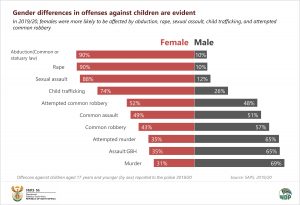Lifting the veil on violence against children in South Africa
A report released by Statistics South Africa titled Child Series Volume II: Crime Against Children shows that rape cases for children increased by 6,3 percentage points between 2015/16 and 2019/20, whilst both common assault and assault with grievous bodily harm (GBH) decreased by 2,1 and 3,5 percentage points respectively. Moreover, sexual assault cases for children increased by 1,4 percentage points.
Crimes against children is a grave concern, as it significantly affects the mental, physical, and emotional health of children. Healing from the trauma of abuse can be a prolonged process spanning several years. Ensuring children are safeguarded against any type of violence is a fundamental right secured by the Convention on the Rights of the Child.
In South Africa (SA), there are high rates of reported violent offenses, encompassing murder, rape, aggravated assault, robbery, property crime, and vehicle hijacking. Among these, rape emerged as the most frequently reported crime to law enforcement for children aged 17 and below between 2015/16 and 2019/20, followed by common assault and assault resulting in GBH.
A comparison between the total reported cases of rape and sexual assault to police compared to those registered for children aged 17 years and younger shows consistently higher per capita rape and assault rates among children. The per capita rate of rape among children rose from 96 per 100,000 children in 2015/2016 to 103 per 100,000 children in 2018/2019, before declining to 95 per 100,000 children in 2019/2020. However, the total per capita rape rate remained steady at 70 per 100,000 population from 2015/2016 onwards. Sexual assault rates were notably lower compared to rape rates, but per capita sexual assault was nearly twice as high among children as it was in the general population. In 2015/2016, per capita sexual assault stood at 20 per 100,000 children compared to 10 per 100,000 total population.
In 2019/20, rape cases were most common in Kwazulu-Natal (20,2%), while sexual assault cases were most prevalent in Western Cape (24,6%).
In 2019/20, females aged 17 years and younger were more likely to be victims of abduction, rape, sexual assault, child trafficking, and attempted common robbery. However, males aged 17 years and younger were more likely to be victims of murder, assault with GBH, attempted murder, common robbery and common assault.
The consequences of child sexual abuse typically encompass teenage pregnancy, diminished self-esteem, feelings of worthlessness, a lack of trust in adults, and a distorted perception of sexuality1. Depending on the severity of these repercussions, some children may even develop suicidal tendencies or engage in self-harm2. South Africa has implemented numerous regulations, policies, and programs, including provisions in the 1996 Constitution, aimed at safeguarding children and preventing crimes against them. Additionally, SA adheres to the United Nations Convention on the Rights of the Child as well as the African Charter on the Rights and Welfare of the Child. This underscores the country’s dedication to ensuring compliance with international and regional standards in achieving child rights and leaving no child behind.
For more information, download the full report here.
1 Donaldson P, Whalen M, and Anastas, 1989. Teen Pregnancy and Sexual Abuse: Exploring the Connection.
2Choi S, et al, 2023. Psychological aftereffects experienced by sexually abused children.


